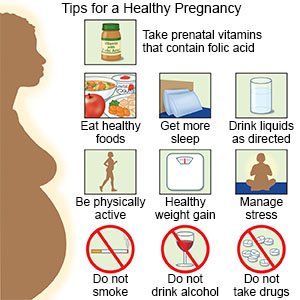First Trimester Pregnancy
Medically reviewed by Drugs.com. Last updated on Aug 4, 2025.
What do I need to know about the first trimester of pregnancy?
A normal pregnancy lasts about 40 weeks. The first trimester lasts from your last period through the 12th week of pregnancy.
What is prenatal care?
Prenatal care is a series of visits with your healthcare provider throughout your pregnancy. Prenatal care can help prevent problems during pregnancy and childbirth. At each prenatal visit, your healthcare provider will weigh you and check your blood pressure. Your healthcare provider will also check your baby's heartbeat and growth. You may also need the following at some visits:
- A pelvic exam allows your healthcare provider to see your cervix (the bottom part of your uterus). Your healthcare provider will use a speculum to open your vagina. He or she will check the size and shape of your uterus.
- Blood tests may be done to check for any of the following:
- Gestational diabetes or anemia (low iron level)
- Blood type or Rh factor, or certain birth defects
- Immunity to certain diseases, such as chickenpox or rubella
- An infection, such as a sexually transmitted infection, HIV, or hepatitis B
- Hepatitis B may need to be prevented or treated. Hepatitis B is inflammation of the liver caused by the hepatitis B virus (HBV). HBV can spread from a mother to her baby during delivery. You will be checked for HBV as early as possible in the first trimester of each pregnancy. You need the test even if you received the hepatitis B vaccine or were tested before. You may need to have an HBV infection treated before you give birth.
- Urine tests may also be done to check for sugar and protein. These can be signs of gestational diabetes or preeclampsia. Urine tests may also be done to check for signs of infection.
- A fetal ultrasound shows pictures of your baby inside your uterus. The pictures are used to check your baby's development, movement, and position. Your healthcare provider may be able to tell you if you are having a boy or a girl during the ultrasound. This is usually possible at around 18 to 22 weeks.

- Genetic disorder screening tests may be offered to you. These screening tests check your baby's risk for genetic disorders such as Down syndrome. A screening test includes a blood test and ultrasound. Blood tests may be used to check your DNA or your partner's DNA. Genetic tests are not always accurate or complete. Your baby may be born with a genetic disorder that did not show up in the tests. Talk to your healthcare provider about any concerns you have with genetic testing.
What can I do to have a healthy pregnancy?
 |
- Take prenatal vitamins as directed. Prenatal vitamins provide some of the extra vitamins and minerals you need during pregnancy. The vitamins will contain 400 to 800 micrograms (mcg) of folic acid to help prevent certain conditions, such as spina bifida. You may have started taking prenatal vitamins or folic acid supplements 1 month or more before you became pregnant. Continue taking them through the first trimester.

- Eat a variety of healthy foods. Healthy foods include fruits, vegetables, whole-grain breads, low-fat dairy foods, beans, lean meats, and fish. Drink liquids as directed. Ask how much liquid to drink each day and which liquids are best for you. Limit caffeine to less than 200 milligrams each day. Limit your intake of fish to 2 servings each week. Choose fish low in mercury such as canned light tuna, shrimp, crab, salmon, cod, or tilapia. Do not eat fish high in mercury such as swordfish, tilefish, king mackerel, and shark.

- Drink liquids as directed. Ask how much liquid to drink each day and which liquids are best for you. Some healthy liquids include milk, water, and juice. It is not clear how caffeine affects pregnancy. Limit your intake of caffeine to less than 200 mg each day to avoid possible health problems. Caffeine may be found in coffee, tea, cola, sports drinks, and chocolate. Do not drink alcohol.
- Talk to your healthcare provider before you take medicines. Many medicines can harm your baby, especially during early pregnancy. Ask your healthcare provider before you take any medicines, including over-the-counter medicines, vitamins, herbs, or food supplements. Never use illegal or street drugs while you are pregnant. Talk to your healthcare provider if you are having trouble quitting street drugs.
- Exercise as directed. Ask your healthcare provider about the best exercise plan for you. Exercise may help you feel better and make your labor and delivery easier.

- Do not smoke. Smoking increases your risk of a miscarriage and other health problems during your pregnancy. Smoking can cause your baby to be born too early or weigh less at birth. Quit smoking as soon as you think you might be pregnant. Ask your healthcare provider for information if you need help quitting.
Related medications
What are some safety tips?
- Do not use a hot tub or sauna while you are pregnant, especially during your first trimester. Hot tubs and saunas may raise your baby's temperature and increase the risk of birth defects. It also increases your risk of miscarriage.
- Protect yourself from illness. Toxoplasmosis is a disease that can cause birth defects. To protect yourself from this disease, do not clean your cat's litter box yourself. Ask someone else to clean your cat's litter box while you are pregnant. Also, do not eat raw meat or unwashed fruits and vegetables. Wash your hands after you touch raw meat, and eat only well-cooked meat. Wash fruits and vegetables well before you eat them.

When should I seek immediate care?
- You have pain or cramping in your abdomen or low back.
- You have severe vaginal bleeding or clotting.
When should I call my doctor or obstetrician?
- You have light bleeding.
- You have chills or a fever.
- You have vaginal itching, burning, or pain.
- You have yellow, green, white, or foul-smelling vaginal discharge.
- You have pain or burning when you urinate, less urine than usual, or pink or bloody urine.
- You have questions or concerns about your condition or care.
Care Agreement
You have the right to help plan your care. Learn about your health condition and how it may be treated. Discuss treatment options with your healthcare providers to decide what care you want to receive. You always have the right to refuse treatment. The above information is an educational aid only. It is not intended as medical advice for individual conditions or treatments. Talk to your doctor, nurse or pharmacist before following any medical regimen to see if it is safe and effective for you.© Copyright Merative 2025 Information is for End User's use only and may not be sold, redistributed or otherwise used for commercial purposes.
Learn more about First Trimester Pregnancy
Care guides
Further information
Always consult your healthcare provider to ensure the information displayed on this page applies to your personal circumstances.
